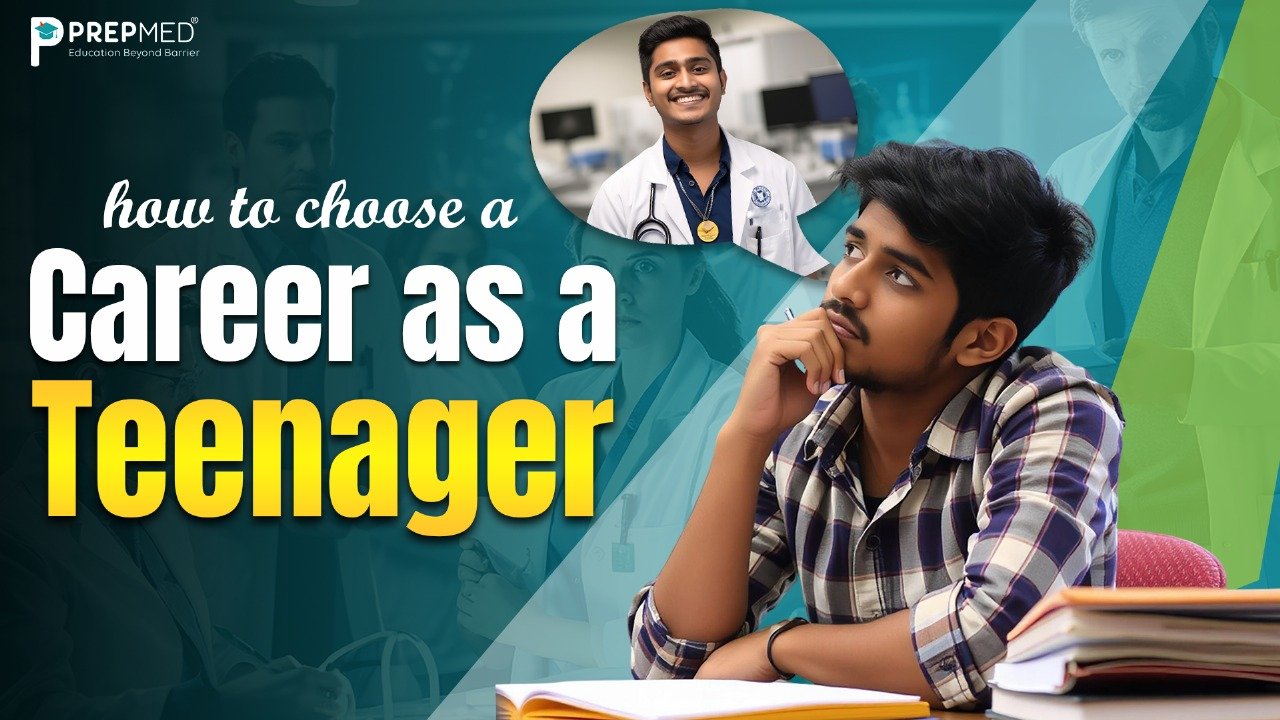October 06, 2025
How To Choose A Career As A Teenager
If you’ve been wondering how to choose a career as a teenager, you’re in good company. Every year, students in India face this question around Class 9, 10, and 12. It usually seems like the most important choice of your life.
Your parents recommend something, teachers recommend something else, and your friends seem to know better than they actually do. But here's the truth: career choices at this stage aren't about having to make a single decision. They're about self-exploration and heading in the right direction step by step.
We’ll give you insight on how to decide on a career path, the difference between how to choose a career after 10th and how to choose a career after 12th, and explore the top 10 best career options that are shaping India’s future.
Why Choosing a Career Feels So Stressful
Some of the stress comes from misinformation around you. Some students believe there's only one "best career," or that they get stuck once they decide. Others believe they must carry on family or peer traditions.
But today's career paths are not set in stone.
Most professionals will shift jobs or even professions several times throughout their lives. It's direction, not perfection, that is important now. You can begin your career without worrying about ending up stuck for life by concentrating on your strengths.
Phase 1: Self-Discovery & Building the Right Mindset
You must understand yourself before you can select a career. Self-understanding is the basis of every significant career choice.
Consider the following reflection questions:
- What topics are most thrilling to me, and why?
- Do I enjoy logical thinking in solving problems, artistic expression, or people-related activities?
- Do I like to guide others, or do I work best on my own?
- What activities or hobbies make me lose all sense of time?
You can also take the help of resources like personality assessments (MBTI, Holland Code) or career aptitude tests. They shouldn't be the final say, but they can give you useful insight.
Rather than looking for "one great answer," consider narrowing down options that align with your existing strengths and values.
Phase 2: Exploring Broad Career Horizons
After you learn about your interests, it's time to broaden your horizons. That's where most students struggle, as they are familiar with only a few professions, such as doctors, engineers, lawyers, or teachers. But times have changed, and you will find many more opportunities.
Methods to find new opportunities:
- Listen to career-oriented videos and podcasts in which experts talk about their experiences.
- Visit school or virtual career fairs.
- Connect with professionals on LinkedIn and get to know their daily work.
- Browse job portals to understand roles and skills required.
At this stage, you should also think about which career is best in India, not just today, but also in the coming decade.
Examples of fast-growing fields in India:
- Data science, AI, and machine learning
- Renewable energy and environmental sciences
- Biotechnology and healthcare research
- E-commerce, digital marketing, and UX/UI design
- Civil services and law enforcement
Exploring doesn’t mean you are committing. It's opening doors and allowing you to see possibilities outside of the known.
Phase 3: Deep Dive & Validation
Once you have explored, you should have shortlisted 2–3 career options that really interest you. Now let's try them out.
How to validate career options:
- Speak with professionals: Get in touch with seniors, alumni, or family friends. Speak to them about their work daily and what they gain.
- Internships and volunteering: Small experiences give you enormous clarity. For instance, a brief internship in the hospital may indicate whether or not medicine seems fascinating to you.
- Online courses and projects: Sites like Coursera, Udemy, and Skillshare allow you to experiment with fields before enrolling for degrees.
- Job research: Do your research on salary, career development, and upcoming trends in India. For example, AI jobs are on the rise, while certain old professions are declining because of automation.
Phase 4: Planning & Prototyping
Now comes the real part: creating your own structure. Your career plan may not be flawless, but it must provide you with direction.
Divide it into phases:
Short-term (6–12 months):
- Select your school subjects or stream (Science, Commerce, Arts).
- Attempt online certifications.
- Join clubs, competitions, or projects.
Medium-term (1–3 years):
- Assemble for entrance exams (engineering, medicine, law, design, etc.).
- Develop a portfolio if you wish to pursue creative streams.
- Improve your basic academic skills.
Long-term (3–5 years):
- Select degree programs aligned with your career goals.
- Network and find mentors.
- Gain real-world experience with internships.
Use this as your prototype. You can refine as you proceed, but a blueprint prevents you from flailing in the dark.
Phase 5: Execution, Review & Pivot
With all the information in hand, it is now time to implement it all. Begin with the path you have chosen, whether that involves signing up for a coaching class or studying for an entrance exam.
But this is the trick: check your progress frequently. Every 6–12 months, ask yourself:
- Am I loving this direction?
- Are skills that are worth having forming?
- Is there something else that gets me more pumped?
If the answer changes, don't be afraid to shift. Most successful individuals only discovered what they were really meant to do after exploring several paths.
So why follow this structured process instead of randomly picking a career? Because a step-by-step approach lowers stress and makes sure you’re making informed choices.
Let’s break down some common milestones in the Indian student journey.
How to Choose a Career After 10th
This is one of the most critical decisions because it involves selecting your stream: Science, Commerce, or Arts.
- Science stream: Most appropriate for medicine, engineering, research, IT, and pure sciences.
- Commerce stream: Leads to opportunities in finance, management, business, and accounting.
- Arts stream: Opens opportunities for law, humanities, social sciences, design, and creative areas.
Tip: Don't select Science only because it's "prestigious." You should look at your strengths and interests and choose accordingly.
How to Choose a Career After 12th
You will have a better idea of what you want to do in your life by Class 12. This phase is all about selecting a degree or professional course.
If you are in Science, then the choices are medicine, engineering, pharmacy, biotechnology, research, or design.
In Commerce, popular career options are B.Com, CA, CS, CFA, business administration, or entrepreneurship.
In Arts, the options include law, psychology, sociology, political science, fashion design, journalism, etc.
Top 10 Best Career Options in India
If you're curious about which courses are popular and future-proof, then here are the top 10 best career options in India today:
- Doctor / Healthcare Professional
- Engineer (Computer Science, Mechanical, Civil, Electrical)
- Data Scientist / AI Specialist
- Lawyer / Legal Consultant
- Chartered Accountant (CA) / Financial Analyst
- Teacher / Professor
- Digital Marketer / Content Creator
- Designer (UX/UI, Fashion, Graphic)
- Civil Services (IAS, IPS, IFS)
- Entrepreneur / Startup Founder
All these careers are excellent, but the "best" for you would be based on your skill and interest.
Common Mistakes Teenagers Make When Choosing a Career
Deciding on a career in your teens can seem like an impossible decision to make. Many students are unaware that they are making decisions that close doors or create frustration in the future. These are some of the most frequent mistakes, and how to steer clear of them:
1. Following Peer Pressure
Few teens select careers based on what they want to do and not what their friends are doing. For instance, if a group of friends decides to become engineers, it is easy to feel as though you "should" follow suit.
You can face dissatisfaction and poor performance if your ability lies elsewhere. Highlight your personal abilities and interests. Use self-assessment material to find careers where you can find success.
2. Blindly Pursuing Prestige
Prestige can push students to pursue careers in medicine, law, or civil services, even if they do not have a genuine interest in the profession. Respect and recognition are crucial, but using a career solely for status may give you burnout or disengagement.
Ask yourself what drives you every day; passion, curiosity, or personal fulfillment should matter more than what other people think.
3. Neglecting Emerging Industries
Most students limit themselves to well-known traditional options like engineering, medicine, or law, ignoring emerging areas like data science, digital marketing, AI, UX/UI design, or renewable energy.
Not paying attention to emerging careers means forgoing opportunities with high growth potential. Look into future-oriented industries and read about career trends to remain updated.
4. Not Seeking Guidance
It can be stressful and overwhelming to try to make sense of everything on your own. Lack of advice from career counselors, mentors, teachers, or professionals can keep you from knowing what kind of careers are best for your skills and interests.
Actively seek advice or gain career counseling sessions to benefit from professional opinions.
5. Fear of Change
Some students feel that after they decide on a career, it is set in stone. This fear may trap them on tracks that are not of interest to them. In life, most professionals change careers several times and usually end up more satisfied and successful after the change.
Think of your career choice as an open-ended plan that should be looked at every year and changed when needed.
6. Underestimating Skill Development
Only thinking about the "name" of a career without skill development is likely to come back and haunt you. For instance, future doctors require a solid science background, and potential designers will have to develop portfolios and programming skills.
Begin acquiring relevant skills early by taking online courses or working on small projects to get hands-on experience.
7. Hurrying the Choice
Certain teens are pushed to commit after Class 10 or 12, without adequate exploration. This leads to regrets or changing streams. Take time for self-discovery, research, and validation before selecting a career option. A few months of patient exploration can save years of confusion.
Frequently Asked Questions
1] Which is the best career in India?
There is no perfect career. Healthcare, IT, civil services, and finance are well-regarded, but the "best" career is the one where you find satisfaction.
2] What if I regret my choice later?
Don’t worry. Career decisions are not fixed. Most people make a completely different career choice years later, after realizing what they need to do.
3] How can I pick a career for myself if I'm still thinking about it?
Start small. Take free courses and observe other experts you know. You get clarity through action, and not through constant overthinking.
Take Your time to Choose Your Career
You can confidently embark on making the first steps of a rich life by integrating self-discovery, exploration, planning, and action. Picking a career isn't about finding the "perfect" solution today. You have to choose a path today while being open enough to grow as you go along the way.
Get the Guidance You Need with PrepMed Coaching
Become a part of PrepMed Coaching if you are still confused about your career. Our mentors direct students like you towards intelligent and well-informed career decisions. We give you access to:
- Live interactive classes
- Special study material
- one-on-one doubt-clearing support
No more leaving your career to chance. Start to clear up with PrepMed Coaching today!
Also read:
Career counselling for 12th science students (only for medical field)
What are the careers in the medical field
Top 10 best courses and career options after NEET






